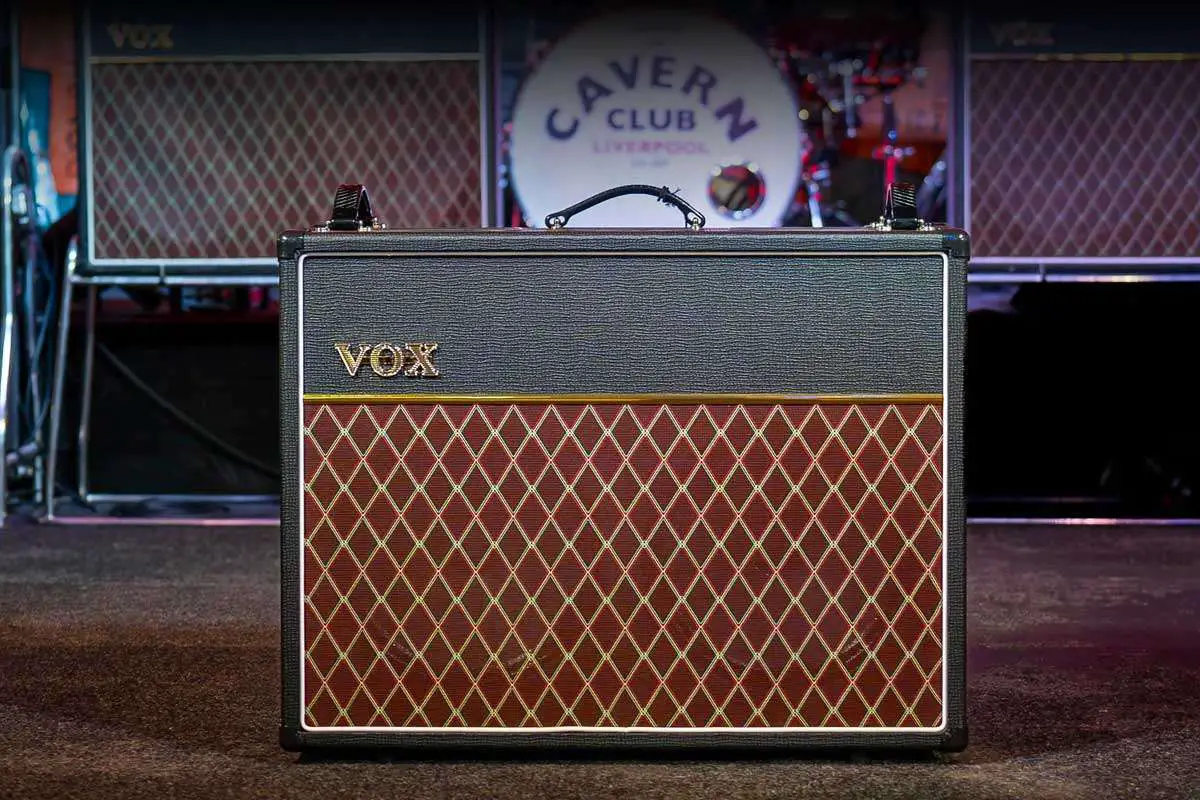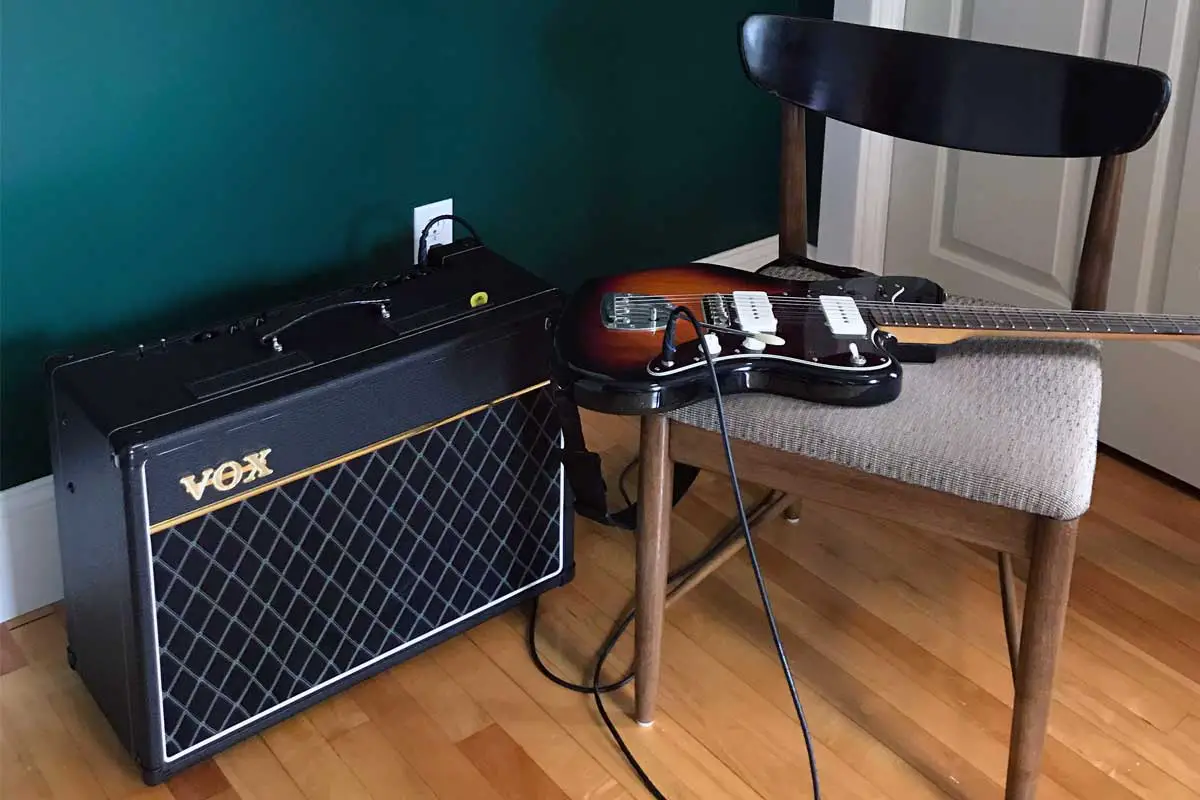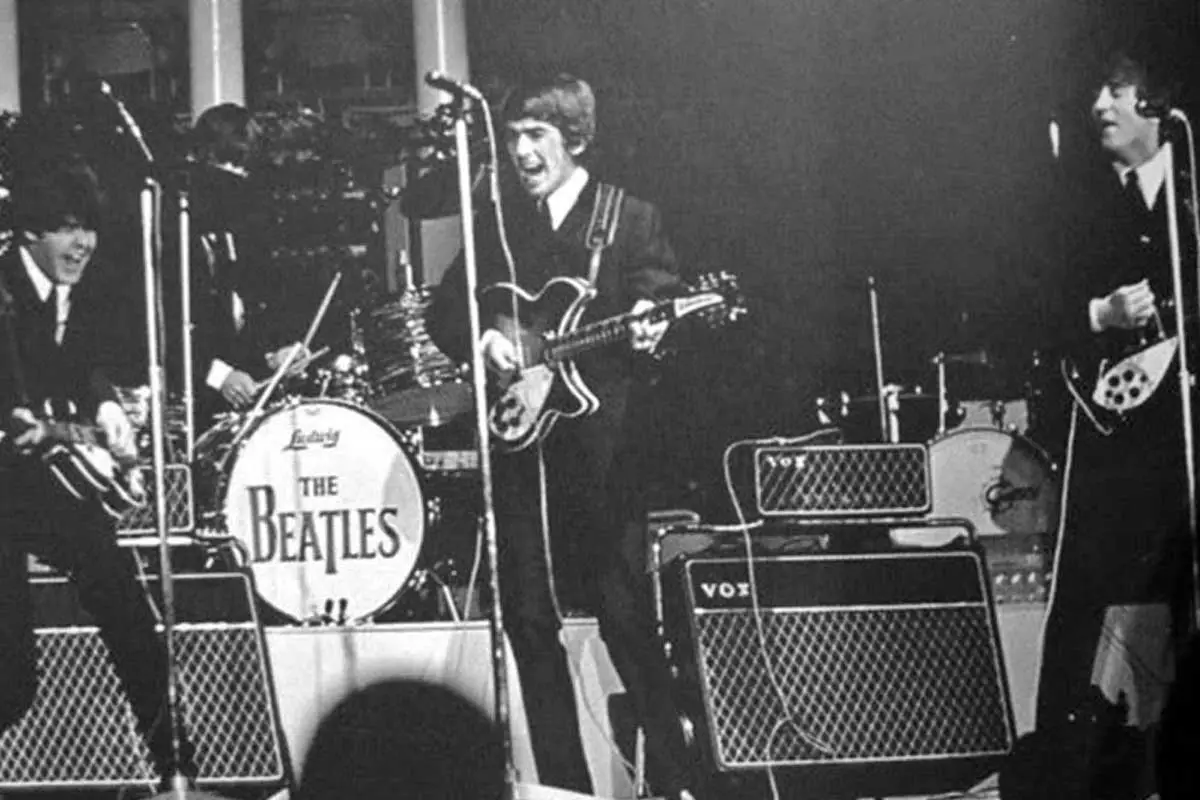The Vox amp history is carved out in a distinct place in the pantheon of music history, one closely associated with the British Invasion of the 1960s. Their distinctive sound and iconic design set them apart, making them the go-to choice for many influential guitarists. The Vox brand has become synonymous with the jangly guitar tone that powered hits from legendary bands such as The Beatles and The Rolling Stones.
The journey of Vox, known formally as Vox Amplification Ltd., began in Dartford, Kent in England. It was here that the company established itself as a major force in shaping the sound of rock and roll. With the creation of the AC15 amplifier in the late 1950s, swiftly followed by the AC30, Vox achieved a sound that was both rich and cutting. This helped to catapult the brand to the forefront of the music scene during a time of rapid change and innovation.
Since those early days, Vox amplifiers have continued to evolve, yet they’ve retained the core qualities that made them famous. They are renowned for their clear, bell-like chime and overdriven warmth, which has afforded them endurance in an industry of relentless innovation. Musicians across different genres still seek out the classic Vox sound, whether they’re playing vintage models or modern reissues designed to capture the essence of that revolutionary era.

Early History of Vox
The iconic Vox brand, known for its distinctive guitar amplifiers, was founded on the pioneering efforts of Thomas Walter Jennings in the 1950s. Pivotal to the formation of a sound that would define an era, the early Vox amplifiers were a testament to innovation in electric music amplification.
Formation of Jennings Organ Company
Thomas Walter Jennings began his foray into musical instrument production with the Jennings Organ Company in Dartford, Kent. Focused initially on creating electronic organs, Jennings’s vision led to the creation of an enterprise that would soon transition into a cornerstone of rock ‘n’ roll history.
From Organs to Amplifiers
As the rock ‘n’ roll scene burgeoned in London, England, the demand for amplification grew. The Jennings Organ Company, recognizing this shift, evolved into JMI (Jennings Musical Instruments) and started producing guitar amplifiers, marking a pivotal change from their organ roots.
The Birth of the Vox AC15
Dick Denney, a key figure in Vox history, joined Jennings and designed the first Vox amplifier, the AC15. With its dual-channel design, featuring EF86 and EL84 tubes, the AC15 was quickly adopted by British musicians seeking more volume and a crisper sound.
Introduction of the AC30
The emergence of the Vox AC30, a successor to the AC15, was in response to artists like Hank Marvin of The Shadows who needed even greater amplification for larger venues. The AC30’s innovative design included the use of four EL84 power tubes and is revered for its distinctive, overdriven sound characteristic of the British Invasion.
Iconic Models and Technical Innovations
The legendary status of Vox amplifiers is due in large part to their iconic models and the technical innovations they introduced to the music industry, defining the sound of a generation.

The Vox AC30 Top Boost
The Vox AC30 Top Boost model is a cornerstone in the pantheon of guitar amplifiers. Introduced in the early 1960s, the Top Boost circuit was an innovation that allowed for more control over treble and bass frequencies, profoundly shaping the British Invasion’s jangly sound. Equipped with EL84 power tubes and Alnico Blue speakers, the AC30 was renowned for its rich, harmonically complex tone and its ability to cut through the mix with its distinctive chime.
Later Models: AC10, AC4, and More
Following the success of the AC30, Vox expanded its lineup with models like the AC10 and the AC4, providing a spectrum of amplifiers with varying power and portability. The AC10 was a more compact version of the AC30, praised for its creamy overdrive at lower volumes, while the AC4 offered an even more accessible entry point into the Vox sound. Each model adhered to Vox’s high standards for quality and tone, with features like the EF86 preamp tube in earlier AC10s contributing to their unique voice.
Advancements in Amplifier Technology
Vox amplifiers have long been associated with groundbreaking amplifier technology. Beyond their all-tube designs, Vox was an early adopter of built-in effects such as tremolo and vibrato, which became staples in many classic Vox amp models. These effects, along with the Top Boost feature, were integral to the expressive capabilities Vox offered to guitarists, enabling a wide palette of sounds that fueled the creative explosion of the 60s and beyond.
Vox and the British Invasion
The unmistakable sound of Vox amplifiers helped define the music of the British Invasion, with legendary bands like The Beatles amplifying their music through Vox’s innovative equipment.
The Beatles and the Vox Amplifiers
The Beatles’ ascent to global stardom was closely accompanied by the Vox AC30, a powerful and versatile amplifier revered for its clear, rich tones that could handle the screaming fans at their performances. The custom-designed Vox amplifiers became a staple for The Beatles, as seen when they used them in iconic appearances such as their 1965 Shea Stadium concert.
Other Key British Bands
Beyond The Beatles, other cornerstone bands of the era like The Rolling Stones, The Kinks, and The Yardbirds also turned to Vox amplifiers for their characteristic jangle and warmth. These bands found that Vox could provide the durability and sonic presence needed for their high-energy performances, contributing to the distinct sound associated with classic British rock music.
Vox’s Role in ’60s Rock Music
Vox amplifiers played a pivotal role in the sound of ’60s rock, beyond just the British invasion. From their ability to produce crisp, clean chords to a thick, overdriven growl when pushed, Vox was the go-to amplifier for many musicians seeking versatility and reliability. Their influence continued to resonate in the music of bands like Queen and U2, proving that the rich, textured tones of Vox could transcend genres and eras.
The Endorsement Era
During the Endorsement Era, Vox amplifiers became synonymous with influential musicians who not only used but actively promoted these iconic amps. Their association with major artists greatly affected the brand’s popularity and the evolution of guitar tone in popular music.
High-Profile Signings and Sponsorships
In the early 1960s, Vox managed to sign The Beatles to a sponsorship deal, which proved to be a monumental success for the brand’s visibility. Vox’s AC30 quickly became the amplifier of choice for the fab four, earning its place on stage during the band’s historic concerts. This partnership played a pivotal role in establishing Vox as a household name. Additionally, The Rolling Stones guitarist Brian Jones was often seen wielding a Vox amplifier, which contributed to the brand’s cool image. Tom Petty, along with his lead guitarist Mike Campbell, would also later become synonymous with Vox amps, utilizing their rich, chiming tone across memorable performances.
Influence on Guitar Tone
Vox amps, particularly the AC30, were instrumental in shaping the distinct sound of 1960s rock and roll. Artists like Hank Marvin of The Shadows and The Edge from U2 found that the AC30’s bright, clear sound with a smooth overdrive perfectly complemented their playing styles. Brian May from Queen famously used a modified AC30 setup to achieve his legendary guitar tone, which is still celebrated for its singing quality and harmonic richness. Moreover, influential guitarists like Jimi Hendrix, Paul Weller, and Rory Gallagher often chose Vox amps, showcasing the versatility and wide-ranging impact of Vox on different genres and styles. The unique tonal qualities of Vox amps helped these musicians forge a sonic identity that was as distinct as their playing techniques.
Modern Evolution
The modern era of Vox amplifiers has been shaped significantly through strategic partnerships and advancements in digital technology. Notably, the affiliation with Korg has led to innovative developments, and the introduction of modeling technology in amps like the Cambridge50 has redefined the musical landscape for guitarists and bass players alike.
Vox’s Partnership with Korg
In an effort to blend classic design with contemporary technology, Vox entered a partnership with the Japanese electronic musical instrument maker, Korg. This alliance aimed at pushing the boundaries of what a traditional amp could do, without losing the distinctive Vox sound that had become iconic over the decades. Their collaboration resulted in the creation of advanced products that cater to the needs of modern musicians, offering both nostalgia and innovation.
Modeling Technology and the Cambridge50
The Cambridge50 stands as a testament to Vox’s commitment to incorporating modeling technology into their amplifiers. This modeling tech is capable of reproducing a variety of classic and modern tones, harnessing the flexibility digital simulation provides. Beyond emulating Vox’s own traditional sounds, the Cambridge50 includes numerous presets and built-in effects, granting users an expansive sonic palette to craft their individual tone. With the integration of this technology, bass players and guitarists can toggle between different amp models and effects on the fly, making the Cambridge50 a versatile tool for both practice and performance.
Cultural Impact and Legacy
Vox amplifiers have played a pivotal role in shaping the sound of popular music, particularly in the rock genre. Their distinctive tonal character and association with iconic bands have cemented their place in music history.
Vox in Popular Music
Vox’s unique sound has permeated popular music since its inception. The Beatles, for example, famously utilized the Vox AC30 amp, contributing to their groundbreaking tonality during the British Invasion of the 1960s. This Vox AC30, characterized by its jangly clarity and warm overdrive, became an integral part of the Beatles’ sonic identity and a staple for other bands that followed. The influence of Vox amps can be traced throughout the works of countless artists, becoming an enduring symbol in the evolution of popular music’s sound.
Contribution to Rock ‘n’ Roll and Beyond
In the realm of rock ‘n’ roll, the Vox amplifier’s overdriven tones provided the backbone for the genre’s most memorable riffs and performances. They helped define the ever-evolving rock sound, from the classic blues-infused style of the early years to the psychedelic era and beyond. Vox’s amplifiers, particularly models like the AC30 and AC15, offered the necessary power and audibility for live rock ‘n’ roll performances, forever changing the dynamics of stage presence and audience engagement. Their sustained popularity among musicians signals the lasting legacy Vox has etched into the history of rock.
Comparisons and Competition
Vox amplifiers have a distinctive place in music history, characterized by their unique tone and rivalry with other brands, especially Fender. This section explores the nuances of these comparisons and how Vox carved its niche in the market.
Vox vs. Fender
Vox and Fender are often compared for their respective impacts on the guitar amp market. The Vox AC30, with its six-input copper-panel, is renowned for its chime and top-end clarity, setting a different standard from Fender’s emphasis on tremolo and clean tones. These sonic characteristics have defined genres and choice of gear among musicians. Information about the technical distinctions between Vox and Fender amps can be traced in historical analyses such as a full technical comparison and analysis of their designs.
British vs. American Amplifiers
The debate between British and American amplifiers extends beyond Vox and Fender. Characteristically, British amps, like Vox, are known for a “cut-through” sound that has been a staple in British rock, while American amps tend to offer a wider range of sounds including the warm and bold tones popular in American genres. This distinction plays a key role in an artist’s preference and the tonal landscape of different musical movements.
Vox’s Place in the Guitar Amp Market
Vox has maintained a cherished role in the guitar amp market due to its specific sound profile. Even with the competition from various companies and technologies, the lower cost of VOx detectors has kept them competitive. Furthermore, despite the ever-evolving nature of music tech, the historical and cultural significance of Vox amplifiers has remained intact. The AC30, in particular, has sustained its reputation and can be credited with defining the ‘British sound’ that dominated the airwaves during the British Invasion of the 1960s. More information on the production and cost-effectiveness of VOx detectors is discussed in the article History of infrared detectors.
The continued appeal of Vox amplifiers is testament to their quality and the unmistakable sound that has captured the ears of generations. Whether it’s the warmth of the tube amp or the distinct chime that cuts through a mix, Vox has left an indelible mark on music history.
Conclusion
The Vox amplifier has had a lasting impact on the music industry since its inception. Iconic for its unique sound and classic design, the Vox AC30 model, in particular, stands as a testament to the brand’s influence. Favored by legendary musicians for its distinctive jangle and rich overtones, it has become a benchmark for quality sound in guitar amps.

The enduring appeal of Vox amplifiers can be attributed to several factors:
- Their aesthetic, with the signature diamond grille cloth and tolex covering, captures the essence of a bygone era.
- The technical merits, such as the top boost circuit, which adds an extra dimension to the sound.
- The cultural association with the British Invasion, linking them to an era of musical revolution.
Despite the ebb and flow of musical tastes, Vox’s commitment to maintaining the quality of their sound has ensured that they remain relevant and sought after. Whether it’s through vintage models or modern reissues, their amps continue to be a cornerstone for artists seeking a unique tonal quality.
The future for Vox amps looks optimistic, with continuous innovations that respect their rich history while embracing new technology. As they evolve, the core characteristics that made the amps a historical significance remain an integral part of their identity. They exemplify not just a piece of music equipment, but a heritage that continues to resonate with guitarists around the world.
